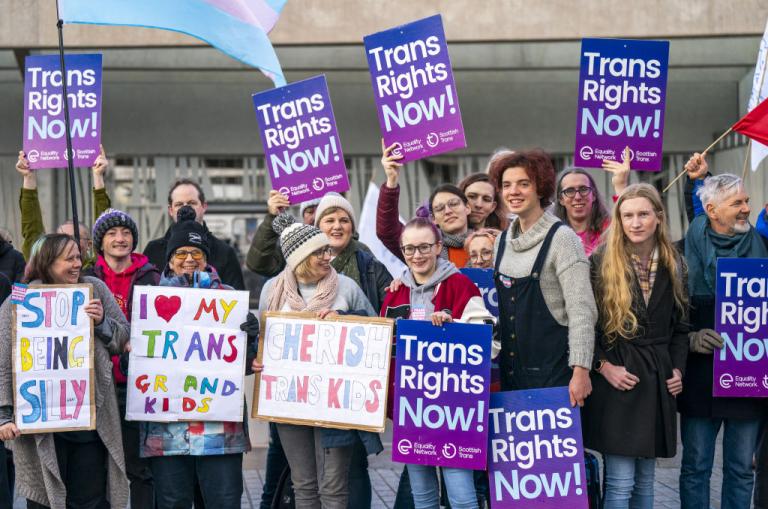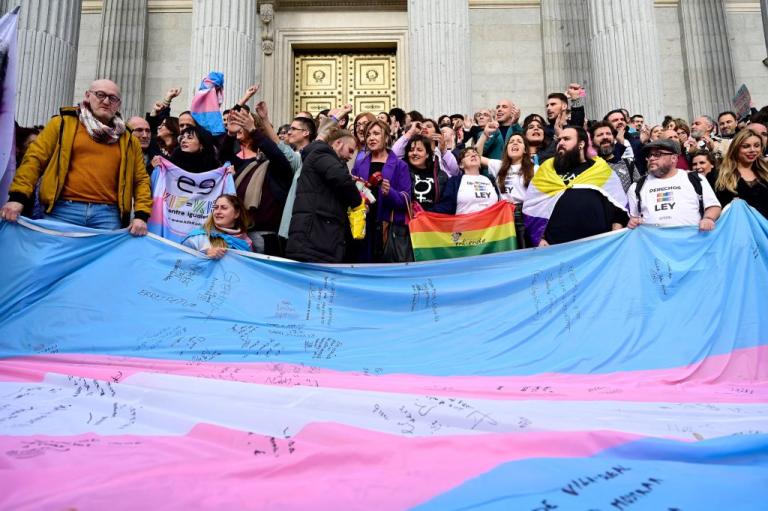
Insights
Don’t Hold Back Transgender Rights in Scotland, Spain
Region(s)
TOPIC(s)
Type
Commentary
Author(s)
Publish Date
January 16, 2023
Share
The British government’s decision today to veto a Scottish gender identity law is a devastating blow to transgender people’s human rights.
As 2022 drew to a close, transgender people all over the world were buoyed by the nearly simultaneous passage of new bills in Spain and in Scotland that introduced systems of self-declaration for legal gender recognition, codifying the human rights of transgender people to self-identify.
But the United Kingdom, which has a stricter process for gender identity recognition, invoked Section 35 of the Scotland Act for the first time in history to veto a bill passed by Scotland’s parliament. UK officials claimed the Scottish law would lead to “legal chaos” and a rise in “gender tourism” with people traveling north of the English-Scottish border to obtain a legal gender recognition certification. Scottish MPs say the veto violates the country’s sovereignty. With the UK attempting to position itself as a champion of lesbian, gay, bisexual and transgender people’s rights around the globe, this move shows a stark disregard for the well-being of transgender people.
The Scottish bill, like its Spanish counterpart, would remove the need for a psychiatric diagnosis of gender dysphoria, reduce the time someone must have been permanently living in their gender before applying, and allow anyone above 16 to request a change, simplifying processes that many transgender people have found onerous, intrusive and distressing.

The bills respond to a growing body of international human rights law that recognizes transgender people’s rights to freedom from discrimination, equal protection before the law, privacy, identity, and freedom of expression. Denying the right to self-identification is a human rights violation. When transgender people are forced to use identification documents that do not match their gender expression, daily encounters in which their documents are scrutinized can literally put their lives at risk of transphobic violence. The lack of gender recognition further entrenches transgender people in a spiral of exclusion and marginalization. As the UN High Commissioner for Human Rights has affirmed, “everyone…should have access to legal recognition of their gender identity based on self-identification, through a simple administrative procedure without requirements such as medical certification, diagnosis, treatment or surgery.”
The UK veto emanates from a climate of “transgender moral panic” in which conservative thinkers and self-proclaimed feminists align to curb the advancement of transgender rights. This trans-exclusionary narrative, rooted in the wrongful view that recognition of transgender people is harmful to women, has a long history of obstructing transgender rights in Britain, such as in 2018 during a legal review of the 2004 Gender Recognition Act. The trans-exclusionary narrative received a boost in the media and added to the Scottish debate when Reem Alsalem, the UN Special Rapporteur on violence against women and girls, its causes and consequences, sent a letter to the UK government on November 29 claiming that decision-makers should take into account the voices of those who believe that male sex offenders could abuse the law, change their gender based on self-identification, and access ‘women-only’ spaces.
These claims lack any evidentiary basis. They rely on a false terrorizing narrative based on hypothetical threats of violence against cisgender women as a pretext to disregard the very real violence that transgender people, especially transgender women, face, including when they are excluded from facilities that align with their gender expression. Victor Madrigal-Borloz, the UN’s independent expert on protection against violence and discrimination based on sexual orientation and gender identity, has pointed out in an official letter that 18 countries have legislated self-determined gender recognition; in the 11 years since the first of these countries, Argentina, passed its Gender Identity Law, there have been no reported cases of “violent men'' abusing this right for nefarious purposes within these countries, while transgender persons have been leading safer lives with their human rights being protected.
In Spain, where the gender identity bill passed in the lower chamber of parliament, it still requires Senate approval. The Senate, expected to make a decision on that country’s bill in the coming days, should vote in favor.

Legal gender recognition through self-identification is a basic human right and should be recognized as such. The UK’s untenable position must not prevail. Outright International hopes to see many more countries riding this progressive wave and passing more humane legislation, simplifying the legal gender recognition of transgender people and ensuring that they can enjoy the full range of human rights guaranteed to them under international law, in 2023 and beyond.

Take Action
When you support our research, you support a growing global movement and celebrate LGBTIQ lives everywhere.
Donate Now